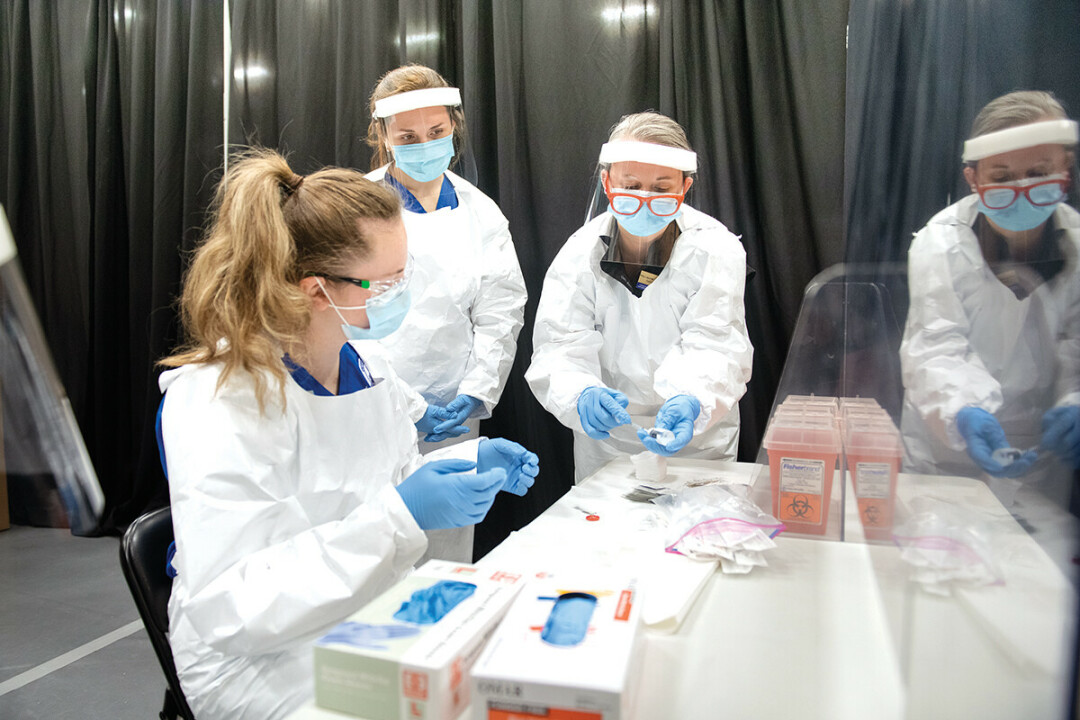Working on the Workforce: Grants Will Help CVTC, UWEC Address Labor Needs
state gives nearly $20M to two local institutions

Two Eau Claire-based higher-education institutions are the recipients of nearly $20 million in competitive statewide grants to help boost the region’s workforce.
Chippewa Valley Technical College received $10 million from the Wisconsin Economic Development Corp.’s Workforce Innovation Grant program, while UW-Eau Claire received $9.4 million. Overall, Gov. Tony Evers announced $59.4 million in grants for 12 regional projects statewide on Dec. 14.
The grants are meant to help institutions better meet the region’s workforce needs, which have been cast into high relief by the pandemic. While the state’s workforce participation rate is high and the unemployment rate is relatively low, officials say many important jobs remain unfilled.
The funds will help CVTC train manufacturing workers, while UWEC will educate and foster more nurses, teachers, and social workers, who are especially needed in the region’s rural communities.
“Employers are struggling to hire qualified workers into key metal fabrication careers throughout the manufacturing sector,” said Sunem Beaton-Garcia, CVTC president. “While these jobs are high-paying and in demand, we need to do what we can to attract people to the field through skilled training and education, which will lead to successful, long-term careers.”
CVTC’s program – known as RESTORE (Restoring Employment through Support, Training, Outreach, Recruitment, and Education) – will be a partnership with Northwood Technical College, Workforce Resource Inc., several regional school districts, and PMI, a metal fabrication business. According to CVTC, it will help underserved rural communities in northwestern Wisconsin.
”
Employers are struggling to hire qualified workers into key metal fabrication careers throughout the manufacturing sector. While these jobs are high-paying and in demand, we need to do what we can to attract people to the field through skilled training and education, which will lead to successful, long-term careers.
Sunem Beaton-Garcia
PRESIDENT, CVTC
“The project will work to provide innovative options to access learning opportunities throughout our communities,” Beaton-Garcia said. “This will be done by creating training hubs to access education and equipment in strategic locations of the region utilizing mobile labs, implementing short-term training programs, and facilitating career pathway planning events.”
Meanwhile, UWEC will use its $9.4 million grant on “strengthening the workforce for rural health and wellbeing.” The program will be a collaboration with Mayo Clinic Health System as well as school districts, county social service agencies, and small business networks across a 16-county region.
According to UWEC, “The four pillars of the project include addressing workforce shortages for nurses, teachers, and social workers in rural communities; developing new degree programs and career pathways at UW-Eau Claire in high-demand health care fields; piloting a health care delivery model based on technology-enabled health care hubs and ‘care coaches’ trained to facilitate bidirectional communication between provider and patient; and creating innovative curriculum and providing entrepreneurs and local business owners with business services and innovation support to better weather future economic challenges.”
Specific initiatives include educating and graduating 48 additional nurses annually; supporting tuition for more nurse educators; giving tuition support to 600 students during student teaching placements or internships at rural school districts and social work agencies; establishing a rural teacher support network; and much more.
“We are ready to hit the ground running,” said Dr. Mike Carney, assistant chancellor for strategic partnerships and program development, who helped write the grant proposal. “We are thrilled to receive this grant, and we are excited to collaborate with our partners and begin addressing some of the significant needs that exist in the rural communities of northwestern Wisconsin.”
David Minor, president and CEO of the Eau Claire Area Chamber of Commerce, was excited to learn of the grants, and noted proudly that the region received nearly one-third of the money given out statewide. Like every other part of the state, the Chippewa Valley faces workforce challenges caused by an aging population, as well as the many changes brought about by the pandemic, which have led more people to consider starting their own businesses or returning to school, Minor said.
While there’s no “silver bullet” to meeting all the needs of the workforce, “When you look at the (grant-winning) programs themselves and what they are going to do … these are short- to long-term solutions that will help us solve the problems,” Minor said.
He added that the grants were part of an ongoing trend of the Chippewa Valley receiving a large share of statewide grant money. “Those people who are giving the grants believe in the good things that are happening here,” Minor said.






















